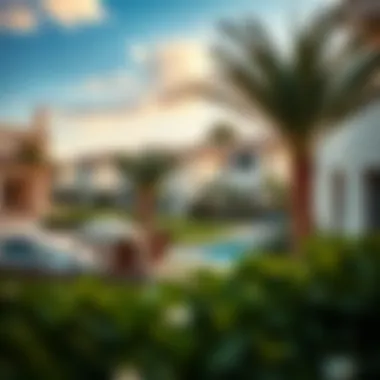Understanding Makaan: The Real Estate Landscape in Dubai


Market Trends and Analysis
Current Market Conditions
The Dubai real estate scene is a bustling arena, where towers shine like polished gems against the backdrop of the sun-drenched desert. As of late 2023, the market has exhibited resilience, bouncing back from the uncertainties brought on by the pandemic. Properties in districts such as Downtown Dubai and Dubai Marina have witnessed a marked increase in demand, primarily driven by expatriates and investors eager to take advantage of the favorable pricing and potential for capital appreciation.
Recent reports indicate that the average prices for residential properties have seen a revival. For example, luxury villas in Palm Jumeirah and high-end apartments in the Burj Khalifa area are fetching impressive prices, even with a boost in rental yields. The trends suggest a shift in buyer behavior, where many opt for a blend of affordability and luxury, looking not just for a home but an investment.
Factors from low interest rates to relaxed visa regulations have injected life into this market. Additionally, the upcoming Expo 2023 has generated further optimism, as it positions Dubai as a hub for international business and tourism.
"Dubai's real estate has shown a remarkable recovery, signaling strong fundamentals that attract both local and foreign investors."
Future Projections and Opportunities
The outlook for Dubai's real estate is promising. Analysts project that demand will continue to rise, especially in the luxury segment. Opportunities exist in emerging neighborhoods such as Dubai Creek Harbour and Al Furjan, areas which could be the next hotspots for savvy investors.
Moreover, as sustainability becomes a priority, green buildings are likely to become more prevalent, meeting the demands of eco-conscious buyers. Keeping an eye on regulatory changes is crucial, as these can stimulate growth and affect investment decisions.
In summary, the market appears to be on a steady incline, with numerous opportunities for those who are willing to adapt to its evolving nature. By understanding the intricate dynamics at play, investors, agents, and home buyers can make informed decisions moving forward.
Investment Strategies
Best Areas for Investment
When it comes to choosing the right location for property investment in Dubai, a few areas demonstrate significant potential. The following locations are worth considering:
- Jumeirah Village Circle (JVC): Offers affordable properties with great rental yields. It's attractive for families and young professionals alike.
- Dubai Investment Park: Known for mixing residential and commercial spaces, this area continues to attract businesses and families seeking a balanced lifestyle.
- Business Bay: With its proximity to the central business district, its modern apartments appeal to expatriates and business professionals.
Identifying up-and-coming neighborhoods can also yield fruitful investments, especially if they surprise with rapid appreciation in value.
Tips for Property Investors
Navigating the Dubai real estate market requires a practical approach. Here are some tips that could help any investor:
- Research Market Trends: Stay informed about property prices and emerging neighborhoods. Use platforms like Property Finder to track trends.
- Understanding Buyer Behavior: Grasp what renters and buyers are looking for—be it luxury, affordability, or community amenities.
- Work with Reputable Agents: Collaborating with seasoned agents can unveil hidden gems in the market and offer valuable insights. Make sure to check reviews on platforms like Reddit or Facebook.
- Legal Considerations: Be vigilant about regulations and ensure all transactions comply with local laws. The Dubai Land Department provides guidelines that are crucial for every investor.
- Long-Term vs Short-Term Rentals: Consider the best rental strategy based on location and property type. Some areas may favor long-term leases while others are ripe for short-term vacation rentals, especially with tourists flocking in.
Investing wisely requires a mix of patience, knowledge, and often, a bit of luck. But with the right groundwork, navigating the Dubai real estate market can lead to rewarding ventures.


Prelims to Makaan
In the sprawling landscape of Dubai, one term that resonates deeply with both locals and expatriates alike is "makaan." Understanding this concept isn't merely an academic exercise; it's fundamental to navigating the complex real estate environment of one of the world's most dynamic cities. The importance of this introduction lies not just in defining a word but in exploring its ramifications for homebuyers, investors, and agents alike. By delving into what makaan signifies, we establish a vital foundation for discussing what housing means in Dubai today.
Defining Makaan in the Context of Real Estate
So, what exactly does makaan mean? In the simplest terms, it translates to 'home' or 'shelter.' But in Dubai, this concept unfolds into a much broader narrative. It reflects a promise—not just of physical dwelling but of security, community, and investment potential. When one speaks of makaan within Dubai's real estate context, it encapsulates various types of property, from luxurious high-rise apartments overlooking the shimmering gulf to more modest dwellings nestled in vibrant neighborhoods.
For investors, understanding the nuances of makaan can aid in discerning the types of property that will not just serve as a residence but also as a financial asset. Moreover, the pervasive cultural emphasis on home ownership in the UAE adds layers of importance. Home signifies stability, permanence, and an emotional connection, making the acquisition of a makaan more than just a transaction; it becomes an integral part of one’s identity.
Furthermore, the concept of makaan intricately weaves through the fabric of Dubai's development policies and urban planning. The government’s policies often reflect an ethos that promotes not only the construction of buildings but the creation of communities where families can thrive, living comfortably in harmony with their surroundings. This focus on community living contrasts with the sometimes impersonal nature of real estate development in other global cities, giving Dubai a unique edge.
Importance of Housing in Dubai
Housing, especially in a city with as rapid development as Dubai, carries massive significance for several reasons. First and foremost, it serves as a critical barometer for economic health. The availability and type of housing impact demographic shifts, consumer behavior, and broader economic trends. Investors and buyers need to keep a pulse on housing developments as they directly influence market dynamics.
Moreover, housing in Dubai isn't just about square footage or architectural styles; it's about meeting the diverse needs of a multicultural populace. The expansive range of properties—from affordable units in suburban communities to extravagant villas in prime locations—caters to various income levels and cultural backgrounds, making housing a crucial element for social integration.
In addition, as global migration continues to shape urban landscapes, the demand for housing in Dubai only grows. With expatriates making up a significant portion of the population, understanding their needs can offer insights into market trends, property values, and the attractiveness of certain neighborhoods.
Ultimately, comprehending the essence of makaan and the importance of housing in Dubai lays the groundwork for any future discussions regarding real estate investment, buyer behavior, and market trends. As we proceed further into the intricacies of the Dubai real estate sector, keeping these foundational principles in mind will prove essential.
Historical Perspectives on Dubai's Real Estate
The story of Dubai's real estate is one of transformation and resilience, mirroring the city itself. Understanding the historical context is crucial; it sheds light on how Dubai evolved from a modest fishing village into a vibrant international hub. This evolution offers important lessons and insights to investors, agents, and buyers looking to navigate the current real estate landscape. It’s not just about the buildings that dot the skyline; it's about the culturally rich and economic fabric that holds everything together.
Growth of Dubai: From Fishing Village to Global City
Dubai's journey began in the early 20th century as a fishing and trading port, heavily reliant on pearls and trade routes. The discovery of oil in the 1960s marked a significant turning point. It was the catalyst that propelled Dubai onto the world stage, and it fueled ambitious development plans. The government invested profits from oil into infrastructure, including hospitals, schools, and roads, laying the groundwork for modern urban living.
As the city grew, so did its population. The influx of expatriates seeking job opportunities turned Dubai into a melting pot of cultures. Fast forward to the late 1990s and early 2000s, when mega-projects started to pop up like mushrooms after rain—Burj Khalifa, Palm Jumeirah, and Dubai Marina became more than just landmarks; they were symbols of what Dubai could become. This development didn't happen overnight; it required vision, investment, and a willingness to embrace change.
Key Milestones in Real Estate Development
Several pivotal milestones signify Dubai's real estate evolution, shaping its vibrant market. Among these, the launch of the Dubai Internet City in 1999, along with the establishment of free zones, marked a notable push towards diversifying the economy. The introduction of mortgage firms in the early 2000s enabled not just the wealthy but also middle-income expatriates to invest in property, creating a surge in demand.
- 2002: The Dubai Government allowed foreigners to own freehold property for the first time, effectively opening the floodgates for international investment.
- 2008: The global financial crisis brought challenges, but it also allowed for a market correction, making properties more accessible.
- 2013: The announcement of Expo 2020 reinvigorated interest in the real estate market, stimulating growth in property development and investment.
- Present Day: The market is evolving again, with a growing emphasis on sustainability and smart technologies; trends that will aim to keep Dubai in the mix over the next decade.


Understanding these milestones not only helps in grasping the dynamics at play today but also illustrates the resilience of Dubai's real estate sector. The challenges faced in the past have equipped stakeholders with experience and strategies that continue to shape their decisions as they look toward the future.
Recent trends indicate that while global economic factors continue to influence the market, Dubai's unique property landscape is characterized by its adaptability and forward-thinking approach. The past serves as a valuable guide, laying the foundation for innovation and opportunity.
"The past is not a dead thing, it is the living fountain of the present." – John Dewey
Market Overview
The market overview serves as a critical lens through which one can assess the dynamic landscape of Dubai's real estate sector. Understanding this market is crucial for investors, agents, and homeowners alike as it lays the groundwork for informed decision-making. By identifying current trends and weighing global economic impacts, stakeholders can navigate potential pitfalls and seize opportunities in this lucrative market.
Current Trends in the Dubai Real Estate Market
In the past years, Dubai's real estate market has witnessed some notable shifts, particularly influenced by shifting buyer preferences and global conditions. Some key trends include:
- Increased Demand for Affordable Housing: There is a growing appetite for affordable housing options among both locals and expatriates. The demand for more budget-friendly homes has forced developers to reconsider their pricing strategies, resulting in a wider array of housing types and price points.
- Sustainability and Green Developments: As eco-consciousness grows, an increasing number of developments are incorporating sustainable practices and technologies. This isn't just a passing fancy; buyers are actively looking for properties that conform to their environmental values. Developers that embrace these concepts often find themselves ahead of the curve.
- Shift Toward Remote Work: The global pandemic has changed the dynamics of how people work and live. With many companies allowing remote work, buyers are more inclined to look for larger homes with dedicated office spaces or properties located in quieter neighborhoods away from business hubs.
"The trends in Dubai's real estate reflect broader shifts in societal values and needs, and those who stay attuned to these changes often come out on top."
- Interest from International Investors: Dubai has maintained its allure for global investors. Factors such as zero property tax and a favorable regulatory environment make it attractive. Recent initiatives by the government, like the UAE Golden Visa, are drawing attention from buyers looking to invest or relocate.
Exploring these trends not only showcases the adaptability of the Dubai market, but also highlights opportunities for astute investors keen on maximizing their gains.
Impact of Global Economic Factors
Dubai's real estate market is not just an island unto itself; it's deeply intertwined with global economic conditions. Several macroeconomic factors can influence the health of this market:
- Oil Prices and Economic Diversification: Being largely dependent on oil prices in the past, fluctuations in these markets had direct consequences on Dubai's economy. However, the emirate's efforts to diversify its economy have borne fruit, leading to more resilience against oil price shocks.
- Currency Fluctuations: The strength of the US dollar, to which the UAE dirham is pegged, plays a critical role. A strong dollar can deter foreign investment while making local properties seem pricier to international buyers. Conversely, a weaker dollar often opens the floodgates for investment and buying.
- Global Economic Trends: Events like the COVID-19 pandemic have significant implications on buyer sentiment and investment patterns. Economic slowdowns in key markets may dampen international buying power, shaping the overall demand in Dubai.
Types of Properties in Dubai
The real estate landscape in Dubai is not just expansive but also incredibly diverse, making an understanding of types of properties critical for anyone looking to invest or buy. The market offers everything from modest apartments to sprawling villas and intricately designed commercial spaces. Each type serves distinct preferences and needs, which ultimately affects investors' decisions, buyer motivations, and rental yield expectations. Familiarity with the various property types can lead to more informed choices and ultimately, successful investment outcomes.
Residential Properties
Residential properties form the backbone of Dubai's real estate market. This category encompasses a wide array, including apartments, townhouses, and villas. Residential spaces can cater to different lifestyles—close-knit families might prefer spacious villas in serene suburbs, while young professionals may lean towards modern apartments in the city center close to amenities.
- Market Demand: The demand for residential properties has remained strong, with both local and expatriate buyers looking to make Dubai their home. The city's booming economy and its attractions make living here a desirable option.
- Options for Buyers: Investors can look at off-plan properties, which are often more affordable, or ready homes that come with the assurance of immediate availability.


Moreover, the allure of community-oriented projects like those in Dubai Marina or Jumeirah Village Circle—where residents enjoy access to parks, schools, and retail spaces—makes these developments appealing.
Commercial Real Estate
Commercial real estate presents lucrative opportunities for savvy investors. This category spans office spaces, retail stores, and industrial sites, catering to the businesses that drive Dubai's economy.
- Economic Role: As a global business hub, Dubai attracts numerous companies looking to establish their presence. Available office spaces vary from high-rise corporate towers in Downtown Dubai to co-working spaces in tech-focused areas like Dubai Silicon Oasis. Investors with a keen eye can identify properties that promise high rental yields due to the demand for such spaces.
- Regulatory Factors: The Dubai government has introduced various incentives to bolster the commercial sector. Foreign investors can now own up to 100% of certain commercial properties—changing the game for many looking to invest.
Maintaining a pulse on the latest trends, such as shifts towards e-commerce warehousing, can provide investors with an edge.
Luxury Developments
When one thinks of luxury in Dubai, opulent high-rises, posh penthouses, and exclusive villa communities come to mind. Luxury developments are not merely properties; they represent lifestyle choices—an indication of status, comfort, and an elevated way of living.
- Market Appeal: High-net-worth individuals from around the globe flock to Dubai to indulge in its lavish real estate options, like the Palm Jumeirah or Burj Khalifa surroundings. Features such as private pools, concierge services, and breathtaking views are common characteristics of luxury properties.
- Investment Factors: While the initial investment can be high, the potential returns are promising. Luxury properties generally hold their value well and even appreciate in the wake of consistent demand from affluent buyers.
In summary, grasping the types of properties in Dubai allows investors and buyers alike to align their strategies with market trends and consumer preferences. Comprehensive knowledge of residential options, commercial spaces, and luxury developments will not only broaden one’s investment portfolio but can enrich one’s overall real estate experience in Dubai.
Investment Opportunities
When one talks about investing in Dubai's real estate, the spotlight invariably shines on opportunities that abound in this affluent market. Understanding these avenues is crucial for anyone looking to make sound investments. The draw of Dubai is not merely its luxurious lifestyle, but also the potential for attractive returns on investment. With property values often on the upswing, it’s important to know where to put your money and how to best capitalize on market trends.
Identifying Lucrative Neighborhoods
Dubai is an ever-evolving city, and with the shifting urban landscapes come opportunities in various neighborhoods. Selecting the right area to invest in isn’t just about looking at the current market prices but also understanding the future potential of these locations. A few neighborhoods worth keeping an eye on include:
- Dubai Marina: Known for its unrivaled waterfront lifestyle, Dubai Marina has been a hotbed for investors due to its attractive yields and burgeoning community.
- Jumeirah Village Circle (JVC): This area has emerged as a favorite for families, offering affordability without skimping on amenities.
- Downtown Dubai: The heartbeat of the city and home to landmarks like the Burj Khalifa, this area continues to attract high-value investments.
- Business Bay: This up-and-coming business hub promises great returns thanks to commercial and mixed-use developments.
By identifying neighborhoods that are on the rise, investors can leverage their investments for long-term gains. Factors such as proximity to transportation, schools, and retail hubs add to an area’s desirability.
Understanding Rental Yields
In any investment, understanding the rental yields is paramount. Dubai, with its expatriate-rich population, has a significant rental market. Properties that generate higher rental yields are key indicators of favorable investment. As of 2023, certain areas have been yielding impressive returns, often in the double digits.
To grasp rental yields, consider the following:
The closing gap between the cost of buying and renting properties significantly influences rental yields.
Rental yield is calculated by dividing the annual rental income of a property by its total cost, expressed as a percentage. For instance, if a property purchased for AED 1,000,000 generates an annual rental income of AED 80,000, the rental yield would be:
plaintext
Rental Yield = (Annual Rental Income / Property Value) x 100
Rental Yield = (80,000 / 1,000,000) x 100 = 8%











